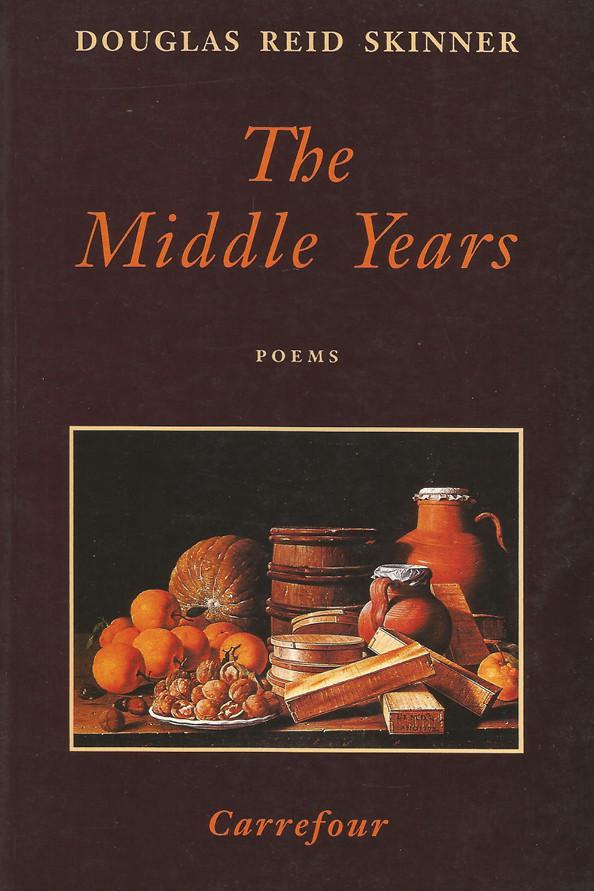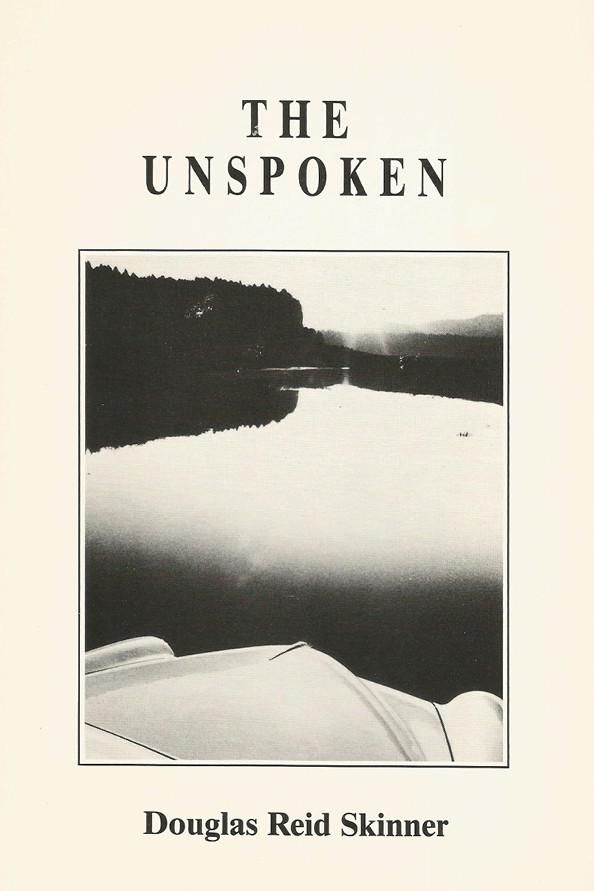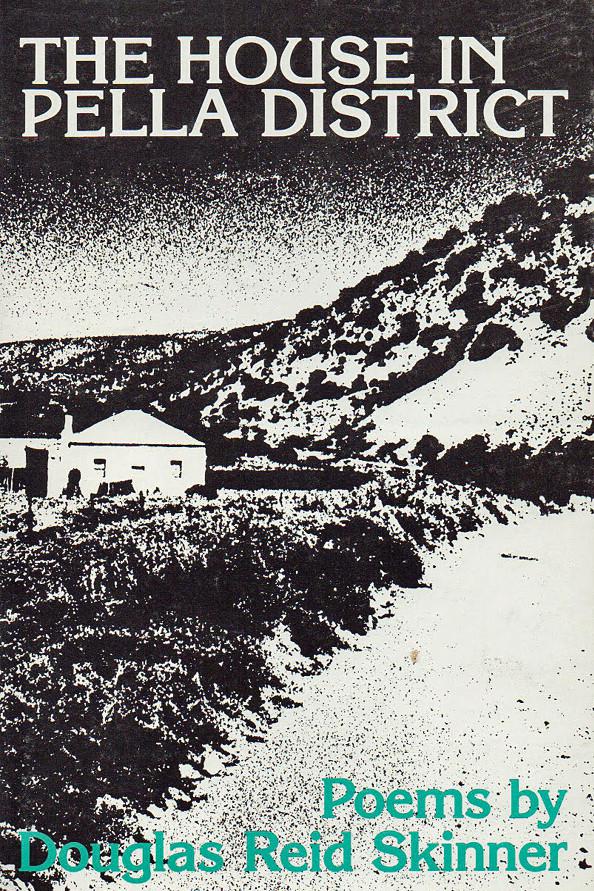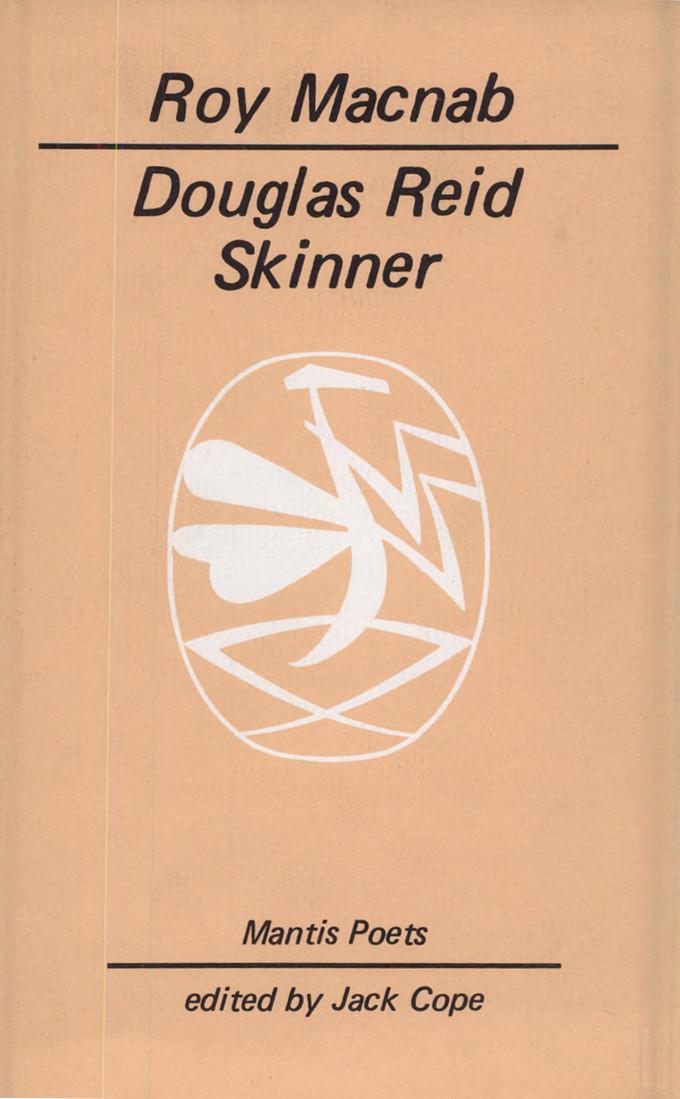Work > Other titles
Time is another thread that keeps on appearing. I would like to have found a way of expressing more of the beautiful scientific discoveries and conundrums in my work, but that’s more difficult than it sounds.
Douglas Reid Skinner

|
The Middle Years (1988)The poems in The Middle Years revisit familiar themes, pondering metaphysics, unpacking family history, puzzling over time, thinking about politics and violence, examining the nature of fiction. Additionally, poems such as ‘Journey’ and ‘Fields’ signal a more conscious exploration self-reflexive ideas through allegory, exploring the idea that, aside of whatever else a poem might be about, it is also always a thesis on poetry. |
-
Journey
- The horizon goes on being there, every morning where
- the light begins, every night where the stars end.
- And always the face of water, every emotion,
- and occasionally smoke, or a school of dolphins.
- Beyond that there is always land.
- The old ones say they can smell it, even when
- half a world away, never touched and never reached,
- its substance no more than folktale, legend.
- Then suddenly one day it is here and now, a place
- that stares back at faces staring at it from the rail,
- a long glitter of beach and swarms of birds
- above forest to the shoreline, a mountain behind.
- But no landing, and no sign of people standing
- to observe the passage of a ship, and you are left
- to imagine them in their living, how they eat and couple,
- talk and sleep, watch for danger from the sea.
- The water continues passing, sibilant, every morning
- metal and blood, every night an endless, impenetrable ink.
- The old ones dream and sniff the air, and when
- dolphins pass, they lean out over the rail, listening.

|
The Unspoken (1988)The Unspoken examines the relationships between public and private life in politics, violence, childhood, war, families, language, memory, history and death. Many of the poems, as Gareth Cornwell once commented, ‘evince a yearning for… [the] redeeming wholeness… absent from human consciousness and experience’ and ‘exhibit a radical scepticism… about the agency of reason to effect the desired atonement…’ |
-
The Visit
- It’s years since anyone drove along this road,
- the tar melting, no cooling wind from the river
- to ease the heat, drove up to the house
- and walked indoors to wash and eat.
- The gate swings open with a creak. Cracked,
- but still intact, the path leads on to where
- door and doorway should have been, but aren’t.
- The walls and roof are gone, and rotted floors
- have given way to prickly, knee-high weeds.
- Fruit on the unpruned orchard trees
- is bitter, and wire fences that once divided
- garden from field and field from land,
- long after strands of iron have been dissolved
- by time or used elsewhere, are still
- easily imagined standing on the lines
- of ironstone pebbles and white quartz chips.
- He looks down at the picture in his palm.
- It shows two people smiling at a child
- at play on blankets spread beneath the trees.
- It’s mid-December and the river’s choir
- sings hard against the unrelenting weight
- of summer’s insect swarms and torpid air.
- It’s years since anyone drove along this road,
- the tar melting, no cooling wind from the river
- to ease the heat, drove up to the house
- and walked indoors to wash and eat.
- The world seems made of found and fallen things.
- This was the first place where he lived.

|
The House in Pella District (1985)Pella is in the Northern Cape area known variously as Namaqualand or Bushmanland, an arid country of desolate yet beautiful landscapes where black eagles still nest, fortunes are made from mining, and little certainty exists except thirst. The poems range widely in locale (Namaqualand, Cape Town, New York, San Francisco, the Eastern Cape, Italy, Spain) and time, concerned with how we mean, the myths and historical moments, and our interdependence with the world of the non-human. |
-
Morning Raga
- – Mt Tamalpais, California
- The ‘best damn watchdogs you ever saw’
- puff up their feather-armour and go beak first
- to battle intruders on the farmyard’s border.
- All posture, all righteous indignation,
- their comic squawking clatters and falls
- amongst the old trees, who’ve seen it all, and more.
- A blue jay responds with a high-pitched retort.
- C’est la guerre! Combat ensues, a vocal sport.
- Attrition and loss are terrible, la mort
- in cyphers
- while bedded lovers of the night before
- awake suddenly, disengage and stare
- dazedly through the window’s light-door
- for sign or portent
- word of Paradise’s fall
- elected without voice
- chosen without choice.
-
Helen
- In the exact distances between
- these walls, I shall wait and wait.
- Serene, my beauty is everything.
- Now, in the morning’s soft light,
- they move over the vast plain
- counting the scattered dead.
- The growing day’s heat brings in
- through a window’s clear space
- the flash of a burnished shield –
- A champion walks by, challenging.
- We will not greet the evening,
- will not caress each other again.
- I dreamed last night of scattered
- stones and the world annulled
- for a thousand years. Can this be?
- My beauty is everything. Tell me
- now as I walk toward you with
- cool marble underneath my feet,
- Tell me that it is everything.
- Touch my forearm, touch my cheek.
- Remember me in the life to come…
